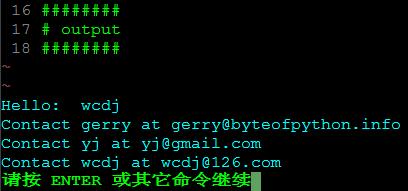Python在函数中使用*和**接收元组和列表
Posted
tags:
篇首语:本文由小常识网(cha138.com)小编为大家整理,主要介绍了Python在函数中使用*和**接收元组和列表相关的知识,希望对你有一定的参考价值。
当要使函数接收元组或字典形式的参数 的时候,有一种特殊的方法,它分别使用*和**前缀 。这种方法在函数需要获取可变数量的参数 的时候特别有用。
[注意]
[1] 由于在args变量前有*前缀 ,所有多余的函数参数都会作为一个元组存储在args中 。如果使用的是**前缀 ,多余的参数则会被认为是一个字典的健/值对 。
[2] 对于def func(*args):,*args表示把传进来的位置参数存储在tuple(元组)args里面。例如,调用func(1, 2, 3) ,args就表示(1, 2, 3)这个元组 。
[3] 对于def func(**args):,**args表示把参数作为字典的健-值对存储在dict(字典)args里面。例如,调用func(a=‘I‘, b=‘am‘, c=‘wcdj‘) ,args就表示{‘a‘:‘I‘, ‘b‘:‘am‘, ‘c‘:‘wcdj‘}这个字典 。
[4] 注意普通参数与*和**参数公用的情况,一般将*和**参数放在参数列表最后。
[元组的情形]
- #! /usr/bin/python
- # Filename: tuple_function.py
- # 2010-7-19 wcdj
- def powersum(power, *args):
- ‘‘‘‘‘Return the sum of each argument raised
- to specified power.‘‘‘
- total=0
- for i in args:
- total+=pow(i,power)
- return total
- print ‘powersum(2, 3, 4)==‘, powersum(2, 3, 4)
- print ‘powersum(2, 10)==‘, powersum(2, 10)
- ########
- # output
- ########
- powersum(2, 3, 4)==25
- powersum(2, 10)==100
[字典的情形]
- #! /usr/bin/python
- # Filename: dict_function.py
- # 2010-7-19 wcdj
- def findad(username, **args):
- ‘‘‘‘‘find address by dictionary‘‘‘
- print ‘Hello: ‘, username
- for name, address in args.items():
- print ‘Contact %s at %s‘ % (name, address)
- findad(‘wcdj‘, gerry=‘[email protected]‘, /
- wcdj=‘[email protected]‘, yj=‘[email protected]‘
在gvim中的输出结果:
http://blog.csdn.net/delphiwcdj/article/details/5746560
以上是关于Python在函数中使用*和**接收元组和列表的主要内容,如果未能解决你的问题,请参考以下文章
Python面试必考重点之列表,元组和字典第四关——编写一个函数(不要使用python模块的函数),打乱列表元素的顺序/如何对列表元素进行随机排列